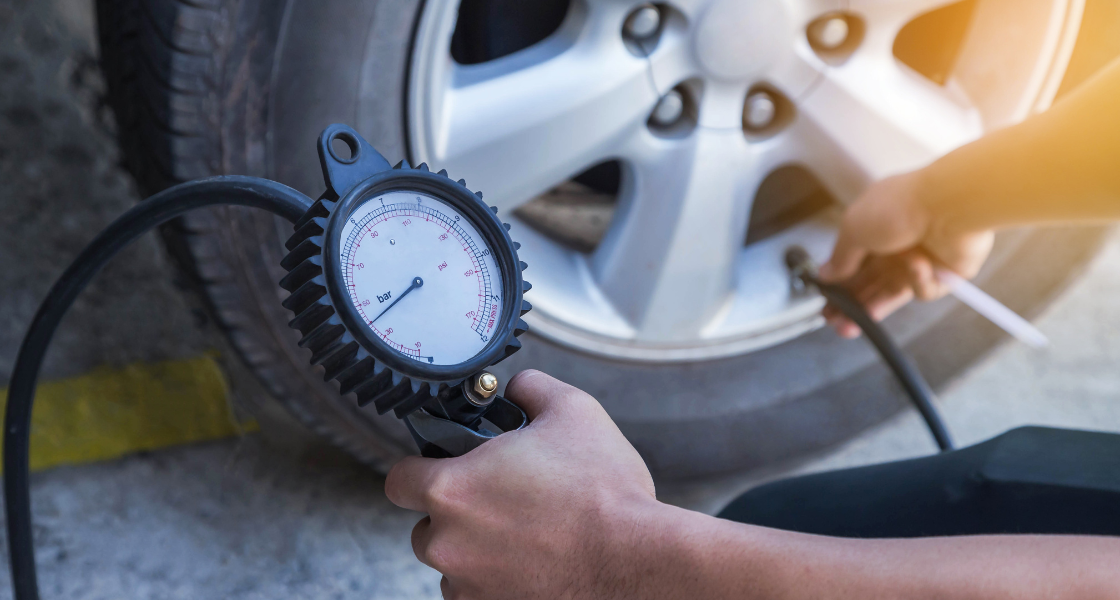Did you know that there is more to a car’s fuel efficiency than just its engine? While the engine plays a crucial role, the condition of your tires also plays a significant part in how efficiently your car uses fuel. Factors such as tire aging, maintaining the correct air pressure, and temperature changes can all impact your car’s fuel economy.
In fact, according to the U.S. Department of Energy, underinflated wheels can decrease fuel efficiency by up to 3%, resulting in higher fuel consumption and increased emissions. This often occurs from the moisture inside regular air tires. It can cause them to expand and contract, leading to fluctuating tire pressure and decreased fuel economy.
This is where nitrogen-filled tires come in. In a study conducted by the National Highway Traffic Safety Administration (NHTSA), using nitrogen-inflated tires resulted in a 6% improvement in fuel efficiency.
We will explore the benefits of nitrogen in maintaining tire inflation pressure to better fuel economy and how having the appropriate pounds per square inch (psi) can lead to longer tire life and better gas mileage.
Table of Contents
ToggleWhat is Nitrogen, and How Does It Differ From Oxygen?
Oxygen and nitrogen gas are colorless, odorless chemical elements. Dry nitrogen gas makes up around 78% of the Earth’s atmosphere, while oxygen makes up roughly 21%. The confusion comes in when air and oxygen are conflated.
Air is a mixture of gases, primarily nitrogen, oxygen, and small amounts of other gases, such as carbon dioxide and water vapor. Air is most commonly used in most tire shops to fill the regular tires of most cars.
What are the Key Properties of Nitrogen?
Pure nitrogen has several key properties that make it an ideal popular choice to fill tires:
- Dry: Unlike compressed air, nitrogen is dry, which means it does not contain any water vapor. This property makes it useful for tire inflation as it helps maintain consistent tire pressure by preventing moisture-related fluctuations in pressure.
- Non-reactive: Nitrogen is non-reactive, so it does not readily react with other substances. This property reduces the risk of tire degradation due to chemical reactions and makes nitrogen-filled tires less likely to corrode.
- Non-flammable: Nitrogen is non-flammable and does not support combustion, making it a safer choice for tire inflation than other gases, such as air.
- Larger molecules: Nitrogen molecules are larger than air molecules, which makes them leak out of the rubber at a much slower rate. This maintains stable tire pressure, resulting in more consistent tire performance and better fuel efficiency.
- Abundant: Nitrogen is abundant and readily available, making it a cost-effective and convenient option for all types of cars and fleets.

Why is Nitrogen’s Inert Nature Beneficial for Tires?
The inert nature of nitrogen is beneficial for tires in several ways. Since it is non-reactive, it does not readily combine with other substances, such as the rubber and metal components of a tire. This lack of reactivity helps to prevent the oxidation and corrosion of these materials over time, which can weaken the tires on the vehicle and increase the risk of tire failure.
Unlike air, it is dry, which means it does not contain any water vapor that could contribute to corrosion or rust inside the tire. Tires with nitrogen keep the interior in good condition, reducing the risk of leaks or punctures caused by weakened or corroded components.
Nitrogen molecules are larger than compressed air molecules; they are less likely to leak out of tires. This results in maintaining proper tire pressure and improved fuel efficiency, as well as reducing the need for frequent refills.
Overall, filling tires with pure nitrogen offers several benefits over regular air, including longer tire life, reduced risk of corrosion and rust, and improved tire performance. By switching to tires with nitrogen, car owners can enjoy safer, more reliable, and cost-effective driving.
Are Nitrogen-Filled Tires Better Than Air-Filled Tires?
Nitrogen-filled tires offer several advantages over air-filled tires, according to various studies and reports. In a Consumer Reports study, nitrogen-filled tires lost pressure at a rate of about 2.2 psi per month, while air-filled tires lost pressure at a rate of about 3.5 psi per month. Nitrogen-filled tires can also improve fuel efficiency by reducing rolling resistance. A recent study found that nitrogen-filled tires lasted up to 25% longer than air-filled tires, attributed to the consistent tire pressure reducing wear and tear. The benefits of nitrogen-filled tires add up over time to provide improved tire performance and longevity.
How Nitrogen Improves Fuel Efficiency
Proper tire pressure is crucial for optimal fuel efficiency. Underinflated tires increase rolling resistance, which requires more energy from the car’s engine to move the vehicle forward. Nitrogen-filled tires maintain proper tire pressure for a longer period, which means that the car’s engine does not have to work as hard to move the vehicle. As a result, nitrogen-filled tires can improve fuel mileage and save car owners money at the pump.
Does Nitrogen Affect Tire Pressure?
Nitrogen helps to maintain consistent tire pressure. However, it is important to note that tires filled with nitrogen still require regular tire maintenance, including checking and maintaining proper inflation pressure. Tire pressure should be checked at least once a month or before a long road trip to ensure optimal performance and safety.
Additionally, proper tire maintenance, such as regular rotations and alignments, is important for optimal tire performance and longevity, regardless of the type of gas used.
Nitrogen’s Role in Extending Tire Life
Nitrogen-filled tires can extend tire life by reducing the risk of corrosion inside the tire. Regular air contains moisture that can cause the tire’s internal components to degrade over time. Nitrogen is a dry gas that does not contain moisture, which reduces the risk of corrosion and extends the tire’s lifespan.
Try Nitrogen Inflation Today!
At Fuel and Tire Saver, we offer a nitrogen tire inflation service as a cost-effective solution for optimizing tire performance!
Our team is committed to the science behind nitrogen tire inflation and can work with you to develop a customized tire maintenance plan that meets the unique needs of your fleet.
Contact Fuel and Tire Saver and check out our resources page to learn more about our nitrogen-filled tires and how we can help keep your fleet rolling smoothly!


